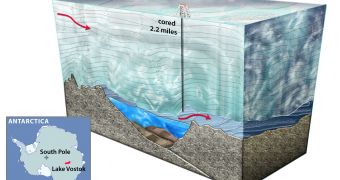It's been a decade and a half in the making, but the Russian team trying to recover samples from the Antarctic Lake Vostok, thousands of meters under the ice, has managed to do just that.
The scientists finally made it all the way to the lake last year, but the samples they recovered were contaminated with material used in the drilling.
Now though, they've announced that they've gotten clean water samples which should provide great info on the conditions in the lake.
The analysis of the contaminated samples showed little signs of life and those found could be attributed to external sources. The hope is that analysis of the new clean samples would eliminate any doubt.
The hope is to find life in the lake that's been cut off from the rest of the world for as much as 20 million years. Lake Vostok is some 3.6 km or 2.25 miles under the ice. It was cut off from the outside world 15 million years ago at the latest as ice sheets began to form over the Antarctic.
Heat from the Earth's core and the incredible pressure of all the ice on top has kept the water from freezing suggesting that, at least in theory, life could be possible.
The conditions in the lake are extreme, the weight of the ice creates massive pressure which also contributes to huge concentrations of nitrogen and oxygen in the water, 50 times more than what's found on surface fresh water lakes. The lake is also completely dark, no light penetrates the ice.
The possibility of life in such extreme and remote conditions has sparked scientists' imagination. Finding an ecosystem there would suggest that life could survive in the unlikeliest of conditions.
Jupiter's moon Europa is thought to have a liquid ocean under its ice surface and the conditions are thought to be at least somewhat similar to those in Lake Vostok. If there's life in Lake Vostok, there may very well be life on Europa, a very enticing prospect.

 14 DAY TRIAL //
14 DAY TRIAL //